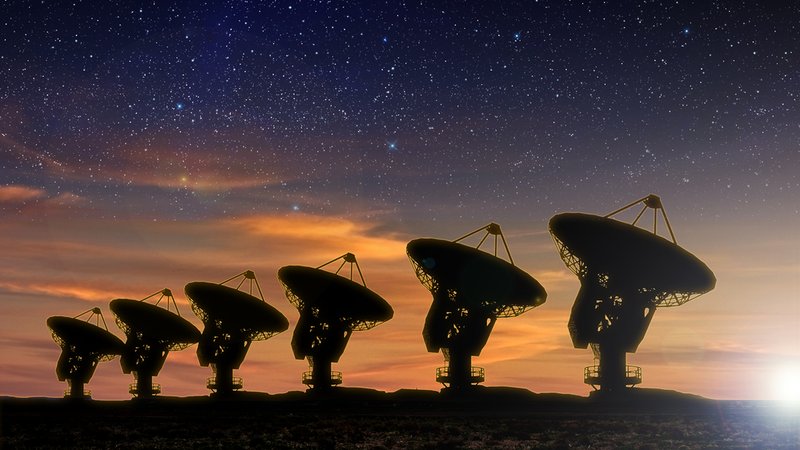A tall sentient being adorning a plush crimson robe stares up in wonderment at an orangish planetary sky illuminated by three large moons. She wonders, “is anyone else out there”? “What strange and mysterious creature might be looking back and contemplating the same thing”? Homo sapiens from planet Earth, you and I, are what this hypothetical alien seeks. We seek desperately and deliberately. Yet we hear nothing. No feeble sound nor symbolic blip. We have been yelling at the top of our electromagnetic lungs, and yet no intelligence has heeded our call. Where are the aliens? If intelligence is the inevitable masterpiece of evolutionary success, why is the Universe not reverberating with the calls of conciousness? Or is it possible that the benefits of intelligence are not so great as we assume, and therefore not so widespread?

Search for Extraterrestrial Intelligence (on Earth)
The puzzling conundrum I have illustrated is known as the paradox of Fermi (Fermi-Hart or Hart-Tipler argument). The paradox as summarized on Wikipedia is “the apparent contradiction between the lack of evidence and high probability estimates for the existence of extraterrestrial civilizations.” It is not instantly obvious why the probabilities should be high. The justifications primarily boil down to laws of large numbers, for example consider the estimated 200-400 billion stars in the Milky Way. Ludicrously large estimates for the number of planetary systems (even the number of Earth-like planets may be quite large indeed) mean that advanced life could be very rare and yet still be numerous. Couple this with the immense time-spans during which civilizations could be sending signals and one might expect a crowded zoo of chattering life. Moreover, recent discoveries in astronomy and biology only increase the seeming abundance of potentially life-bearing worlds. In the recent past, we were entirely ignorant regarding the existence of planets about other stars and the likelihood that such places could support life as we know it. The Kepler space telescope alone has catalogued thousands of exoplanets, and Earth-analogues are far-less rare than previously thought. The latter conclusion is antithetical to one of the more common explanations for the paradox, the “rare Earth hypothesis” or the conjecture that habitable planets are highly unlikely. The discovery of extremophiles and organisms at deep-ocean trenches forced scientists to reevaluate and broaden the prerequisite conditions necessary for life. These habitats bring into question the most fundamental perceived requirements such as water and solar energy.
So what factors are important in estimating the number of intelligent civilizations? In 1961 Frank Drake summarized the relevant variables in the following eponymous equation:
\begin{equation} N = R * f_p * n_e * f_l * f_i * f_c * L \end{equation}
where:
- \(N\): Average number of intelligent (broadcasting) civilizations.
- \(R\): Average rate of star formation in our galaxy.
- \(f_p\): Percentage of stars that support planets.
- \(n_e\): Average number of habitable planets per star.
- \(f_l\): Percentage of habitable planets supporting life.
- \(f_i\): Percentage of planets with life where intelligence emerges.
- \(f_c\): Percentage of planets with intelligent life that are capable of interstellar communication.
- \(L\): Average years a capable civilization broadcasts.
None of the parameters in Drake’s equation are known with much certainty, and generally as one moves from left to right the degree of uncertainty increases. Drake initially assumed a value of 50% for the number of stars with planets, but recent evidence suggests that planets may be more the rule than the exception.
My opinion on the paradox is somewhat unconventional. Specifically, I strongly question the merits (in particular the survivability) of human-like intelligence. Ironically the same intelligence which motivates me to pursue knowledge, to explore the cosmos, and to write this blog. Could intelligence be a net encumbrance rather than an advantage when it comes to long-term survival? I believe that intelligence is not only highly unlikely to evolve in the first place but also that such cognition is ultimately a threat to the continuation of said species. This may seem ludicrous at first, but bear in mind we have only one data point attesting to the value of high cognition. And our species is far too young to make a very strong case for long-term survivability. Referring to the equation, this means I would assume very small values for \(f_i\), \(L\), and possibly \(f_c\). Hence, even if \(f_p\) and \(n_e\) are relatively large \(N\) may still be small (near zero). Certainly I acknowledge that our brains have led to the rapid and dominating role of humans on Earth. The mind has given us music and poetry, the Internet, agriculture, and even the emergence of AI. But it has also brought forth the atomic bomb, global warming, and religious intolerance. Although dystopian our capacity and willingness to destroy others far outpaces the moral maturity required to circumvent our worst tendencies. For most of human history this disparity had minimal consequence. A stone tool can only cause so much suffering and misery relative to its utility. But it seems we are nearing a turning point.
Today our technologies are gravely consequential, to the point where the creations of our collective brain are more perilous than anything from nature. We live in an age where one mind could decide the ultimate fate of all other minds, something evolution could never have envisioned. Despite all this, there are numerous positive signs for the future of intelligence. And I truly hope I am wrong about its ultimate utility. One thing is clear: the age of nuclear fusion, AI, and interplanetary travel is no place for supernatural superstition, nativism, nor economic greed. We must shake the limits, biases, and archaic tendencies of our brain and begin to think of ourselves as one. Above country, politics, or belief system we are the representatives of planet Earth, the only ones to speak for our tiny blue paradise in the heavens.
